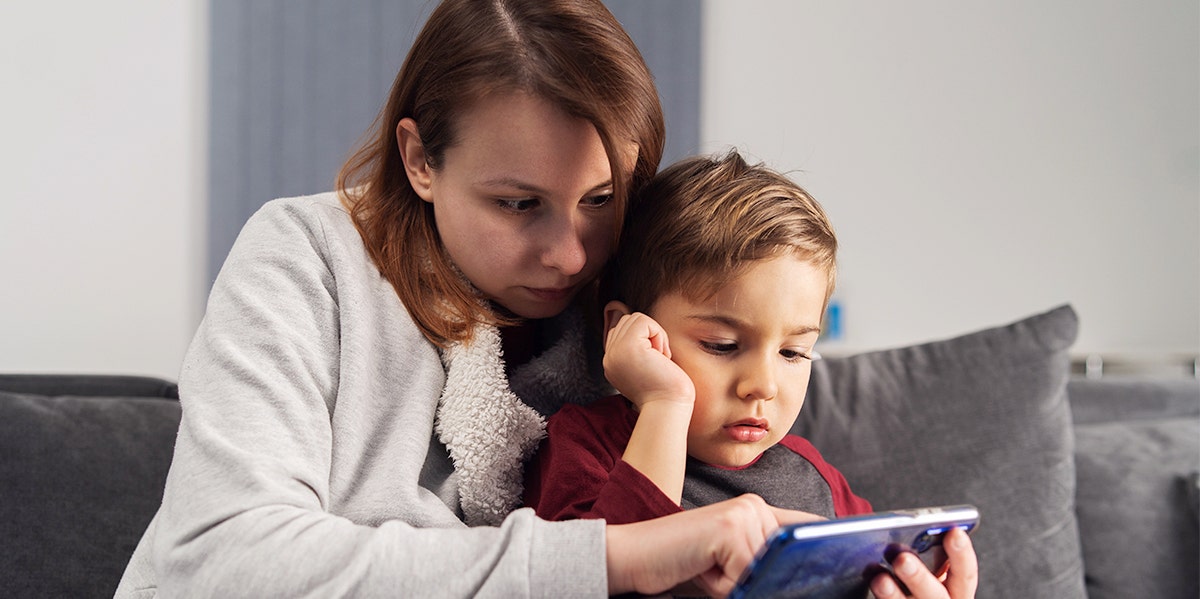I Taught My Son How To Be Human Through His Bossy Relationship With Amazon Alexa
Should kids be saying 'please' and 'thank you' to artificial intelligence?
 Miljan Zivkovic / Shutterstock
Miljan Zivkovic / Shutterstock I knew we had a problem a few months ago when I was singing a song in the car (acapella) and my then-two-year-old son, Taika, called out from his car seat: “Alexa, stop!”
I’m not gonna lie, I felt hurt. He didn’t even say ‘please’.
“I’m not Alexa, Taika, I am mami,” I said, unsure of what else to add, as the wheels in my head started spinning out of control. Why was he confusing his own mother with Alexa? Who exactly did he think Alexa was — some ubiquitous all-knowing presence? Like God? (Uh-oh).
2020 was, as we all know, a year of extended quarantine. Our relationships grew limited; Taika’s circle became tighter. For us, it was pretty much just our extended family pod and, well, Alexa.
Alexa had been there to encourage him to brush his teeth (enter Brush Your Teeth Song) and to introduce him to his favorite tune (Bob Seger’s Old Time Rock N’Roll). She’d done a lot for him and yet, Taika wasn’t very nice to her. Where were his manners? It wasn’t until he addressed me as Alexa that I began to realize how rude he was to her, no matter who or what he thought she might actually be.
I asked a couple of parent-friends what they thought about my AI politeness conundrum: Did they teach their kids to say ‘please’ and ‘thank you’ to Artificial Intelligence? There were mixed reviews and a lot of ‘I don’t know's.’ One friend, with a Ph.D. in education, was firmer about her answer. She believes kids don’t have to say please and thank you to Alexa. It’s important that they differentiate between AI and human interaction.
A few articles, like one I read in Fast Company from 2018 by Mike Elgan, agreed with her. “In teaching children to treat machines like people, we may also be treating people like machines. Telling kids to say ‘please’ and ‘thank you’ to software, knowing that no feelings are involved, could be construed to be telling them to run their courtesy routines automatically regardless of meaning, effect, or purpose,” writes Elgan. "We don’t," he continues, "ask Google to ‘please’ search for something, do we?"
In other words, by adding these please and thank yous, we might be messing with our children’s capacity to think for themselves.
As someone who believes deeply in critical thinking, I have to say that this argument is a powerful one, which burrowed me deeper into the rabbit hole of my questions. And yet, I just couldn’t stop saying please to Alexa, role-modeling for my son.
Then, one afternoon, Taika came running to me from the bedroom where Alexa lives, and said: “Mami, mami, mami, Alexa say ‘welcome’.” When I asked him to show me, Taika pulled my hand and took me to Alexa, pointed his little head up at her, and said: “Alexa, thank you.” To which Alexa responded, “You’re welcome, enjoy your evening.” He was elated. I immediately responded: “Oh, Alexa has such good manners!” He laughed and, totally in control, said thank you to her about a million more times.
The next day, however, as we left the house, Taika called out: “Goodbye, Alexa.”
Eww, I thought. That’s weird.
I wondered if I’d gone too far. “We better cut this out or the other kids at school are gonna think he’s a weirdo,” said my husband, jokingly.
I didn’t care about that. It wasn’t what others thought that I was worried about, it was the battle between politeness, kindness, and critical thinking as it relates to AI raging inside of me that was driving me mad. I even tried putting Alexa “to sleep” for a few days by shutting her off. My son just switched his game: “Hey, Siri…” Plus, I was being a total hypocrite on this anti-tech crusade, as I peddled on the high horse of my Peloton, taking orders from an instructor who wasn’t even in the room.
None of this is new. Man vs machine. Shows like Westworld present us with much the same problem in the adult world. Even Pinocchio, who came from the Industrial Revolution, and an aristocratic Europe-turned-more-Democratic-yet-Colonial, was a puppet who wanted to be a real boy. Geppetto, his maker, is not too far from Victor Frankenstein. Our love-hate relationship with technology, what it does, and what it tells us about ourselves, is as old as we are, and it won’t be fading out anytime soon.
Statistically, as of last year, there were 157 million smart speakers in American homes (many with politeness features I don’t plan on using, replete with privacy controversies). From smart cars to smartwatches, security cameras to sleep systems, Alexa just scratches the surface of where we’re headed.
“Please stop, mami,” says my son from the back seat of our car, interrupting my inner soliloquy, “play rock n’ roll.” Well, that’s something. Now that he’s three, I’m no longer Alexa, and there’s even a ‘please’ in there! Would he have gotten here without my Alexa-drama? Perhaps. But, not without my deep and constant questioning as a parent. This thoughtful battle of mind and heart is, after all, the true mark of our humanity. And it is this that I want to make sure to impart to my son.
Now, excuse me, while I rock-out with my kiddo.
Vanessa Garcia is a multidisciplinary artist working as a screenwriter, novelist, playwright and journalist whose debut novel, White Light, was named one of the Best Books of 2015 by NPR, and won an International Latino Book Award. She's written for Sesame Street and Caillou (among other TV series), and her radio play Ich Bin Ein Berliner about Cuba and the Berlin Wall launches April 2021.

